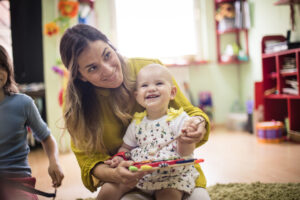Potty training is a significant milestone in a child’s development, and for parents, it can be both exciting and challenging. Every child is unique and may be ready for this transition at their own pace. To ensure a successful and stress-free potty-training experience, it’s essential to understand the biological, verbal, and cognitive milestones your child should achieve before starting potty training. Let’s delve into these milestones and explore effective methods of potty training while setting realistic expectations for parents.
Biological Milestones:
- Physiological Readiness: Before you begin potty training, it’s crucial to ensure that your child is physically ready. Most children are ready to start between 18 months and 3 years old. Signs of physiological readiness include the ability to control their bladder and bowel movements f
- or longer periods and waking up from naps with a dry diaper
- Motor Skills: Your child should have sufficient motor skills to pull down and pull up their pants independently. This skill will help them when they need to use the potty quickly.
- Awareness of Sensations: A child who is ready for potty training will often show signs of discomfort when they have a wet or soiled diaper. They may communicate their discomfort through gestures, words, or facial expressions.
Verbal Milestones:
- Communication Skills: Effective communication is essential for a successful potty-training experience. Your child should be able to understand and use basic words or phrases related to bathroom activities, such as “potty,” “pee,” and “poop.” Clear verbal cues help them express their needs effectively.
- Expressing Needs: Your child should be able to communicate their need to use the potty. This might involve saying, “I have to go potty” or signaling in some way that they need assistance.
Cognitive Milestones:
- Understanding Cause and Effect: Children need to grasp the concept that using the potty leads to specific outcomes. They should be able to connect their actions with the result of flushing waste away.
- Following Simple Instructions: Cognitive development plays a crucial role in potty training. Your child should be able to understand and follow basic instructions related to using the potty.
Potty training methods vary, and no single method is superior. Choose the one that suits your child’s readiness and your family’s lifestyle. What matters is your support and consistency within your chosen approach. Children develop at their own pace. Respect your child’s timeline and their unique response to your chosen method. Patience and love are paramount. Trust your instincts as parents and adapt your approach as needed. Your confidence promotes security for your child during this transition.
In the potty-training journey, flexibility and parental support are key. Embrace your child’s uniqueness and remember that what truly counts is the love and encouragement you provide throughout this important phase of development. Now that we’ve discussed the important milestones, let’s explore some effective potty-training methods:
- Child-Led Approach: This method involves letting your child take the lead. Provide them with a potty chair and encourage them to use it when they feel the need. Be patient and supportive, offering praise for successful attempts.
- Scheduled Potty Breaks: Establish a regular schedule for potty breaks. Take your child to the potty at specific times throughout the day, such as after meals or before bedtime. Consistency is key with this approach.
- Positive Reinforcement: Praise and rewards can motivate your child during potty training. Offer verbal encouragement, stickers, or small treats for successful trips to the potty.
It’s essential to have realistic expectations as a parent when embarking on the potty-training journey, understanding that it is a developmental milestone, and like all milestones, it may come with its share of challenges and triumphs. Remember that potty training is not a one-size-fits-all endeavor, and it can be a lengthy or longer-than-expected process. Some children may master it quickly, while others may take more time.
During this journey, it’s natural to face moments of frustration or doubt, but we want to reassure you that perseverance and patience are your greatest allies. Sticking with your chosen plan and maintaining a positive attitude can make all the difference. Your child will pick up on your confidence and encouragement, which can help ease their transition into this new phase of independence.
Every small step forward is a victory, and setbacks are merely opportunities for growth and learning. So, as you embark on this journey, keep your expectations realistic, stay committed to your approach, and know that your unwavering support and love will guide your child to success in their own time.
Here are some things to keep in mind as you begin the potty-training process.
- Accidents Will Happen: Understand that accidents are a part of the learning process. Be patient and avoid scolding your child. Instead, offer reassurance and help them clean up.
- Progress Varies: Every child is unique, and some may take longer to fully grasp potty training than others. Avoid comparing your child’s progress to others and focus on their individual development.
- Regression is Normal: It is common for children to regress during stressful times or life changes. Be prepared for setbacks and continue to offer support and encouragement.
In your potty-training journey, open communication with your child’s early education teacher can be a significant advantage. Sharing your plans and desires to begin potty training is a proactive step that can lead to a smoother experience for both your child and the adults involved. It creates a united front, ensures consistency, and provides valuable insights on preferred methods and policies. This collaborative approach fosters a sense of stability for your child during this transition, allowing you to share progress, challenges, and goals with the teacher. This partnership ensures a smoother and more successful potty-training experience for everyone involved.
Potty training is a significant milestone in your child’s development, and it is essential to recognize the biological, verbal, and cognitive milestones they should achieve before beginning this journey. By choosing a method that suits your child’s needs and maintaining realistic expectations, you can make the potty-training experience a positive and successful one for both you and your child. Remember that patience, consistency, and plenty of encouragement are key to achieving potty training success.




